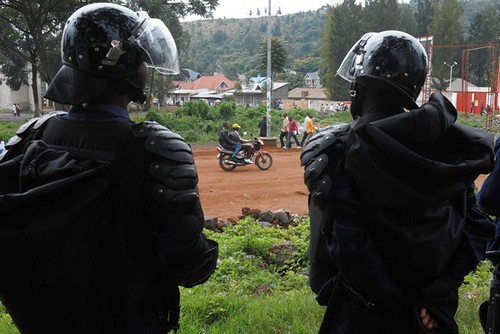
Democratic Republic of Congo riot police stand guard after possible threats to the national security amid the electoral victory of incumbent President Joseph Kabila. The country is a large repository of strategic minerals., a photo by Pan-African News Wire File Photos on Flickr.
Congo Strife Rises After Poll
Results Are Delayed as Opposition Leaders
By SOLOMON MOORE
Wall Street Journal
LUBUMBASHI, Democratic Republic of Congo—Delays in tabulating the final results of this country's presidential and legislative elections are stoking fears of violence after opposition leaders alleged widespread fraud.
After several flawed votes in Africa this year, the continent faces the prospect of yet another disputed election—this one in a massive, mineral-rich nation that shares borders with nine neighbors.
Congolese riot police stood guard in Goma on Tuesday, amid tensions over delays in tabulating the results of presidential and legislative elections.
Violence has also marred recent votes in Ivory Coast, Nigeria and Uganda.
Partial tallies released since the Nov. 28 election, which was extended for two days after some polling stations failed to receive ballots, among other issues, show incumbent President Joseph Kabila with about 5.9 million votes, compared with around 4.6 million for challenger Etienne Tshisekedi, a former prime minister and longtime opposition member.
Although Mr. Tshisekedi appears to be leading the vote count in the capital, Kinshasa, Mr. Kabila is in first place in six of 11 provinces.
Late voting has slowed counting and delayed results that were expected Tuesday. "We will only be able to release preliminary results if we get all the statements from all polling stations," said the Rev. Daniel Ngoy Mulunda-Nyanga, president of Congo's national election commission.
The Associated Press reported that officials late Tuesday announced a 48-hour delay in the publication of election results.
On Election Day, clashes between supporters of the president and opposition backers left 18 people dead around the country.
Tensions over the imminent election results spilled into the streets of Kinshasa on Tuesday, with police firing tear gas to disperse opposition supporters.
Mr. Tshisekedi and other opposition candidates have said their supporters were intimidated and that fraud was widespread during the vote.
Now they are alleging that the count is also rigged in favor of Mr. Kabila. On Tuesday, Mr. Tshisekedi's political party, the Union for Democracy and Social Progress, issued a statement condemning the electoral commission's partial releases and disputing its figures.
Congolese police and soldiers on Tuesday fanned out throughout the country in trucks and on foot patrols in an effort calm tensions. The government also cut text messaging on Monday and Tuesday and delegations from the United Nations and the Southern African Development Community, a regional intergovernmental organization, met with opposition leaders.
Thousands of Congolese residents have fled the country, and those who have stayed are stocking up on food.
"Should they present different results than those collected locally, we will know the people have been defrauded of the rightful election result," Mr. Tshisekedi's office said.
Mr. Tshisekedi sparked concern among some diplomats by declaring himself the winner of the election before a single vote was cast. Now, he is vowing that his supporters will protest if the results shows otherwise.
"The people themselves will do their duty," Mr. Tshisekedi said in an interview. Although he declined to explain exactly what form protests could take, Mr. Tshisekedi said he hoped they would be peaceful. "I have no interest in starting violence," he said. "Even though all Kabila's army will be against us."
Mr. Tshisekedi promised to revamp Congo's economy, recently hit hard by allegations that the government was scaring off multinational mining and oil investors by demanding bribes.
Like most of Mr. Kabila's challengers, Mr. Tshisekedi has promised to invest more in badly needed infrastructure. Congo has a minimal electrical grid and no paved roads or railways that traverse its entire expanse.
Congo's presidential vote is the second since the 2001 assassination of revolutionary Laurent-Désiré Kabila, who overthrew strongman Mobutu Sese Seko in 1997. Kabila's son, Joseph, succeeded him and won election in 2006.
In the run-up to the election, a Kabila-friendly parliament changed election laws requiring victorious candidates to achieve a majority of votes—through a second round of elections if necessary. Now a candidate only needs to win the most votes, even if he only achieves a plurality. Congo's fragmented opposition argued that the rule change favored the incumbent.
Congo's vote has major implications for the continent. As sub-Saharan Africa's least-developed nation and its largest land mass, Congo's decades-old conflicts have been a destabilizing force throughout the continent, impeding growth and entangling armies from Rwanda to South Africa. An estimated five million people died as a result of Congo's 1996-2003 war, mostly from disease and malnutrition.
Anneke Van Woudenberg, a senior researcher with Human Rights Watch, said tallies from eastern North Kivu province were likely among the votes holding up the final result. Ms. Woudenberg said she has received reports of widespread irregularities, including voter intimidation by police and militia groups.
U.S. Ambassador James F. Entwistle called on various political organizations to refrain from prejudging the results before they are released, but he acknowledged that the commission's decision to withhold raw data from polling stations could affect the public's perception of the vote.
No comments:
Post a Comment